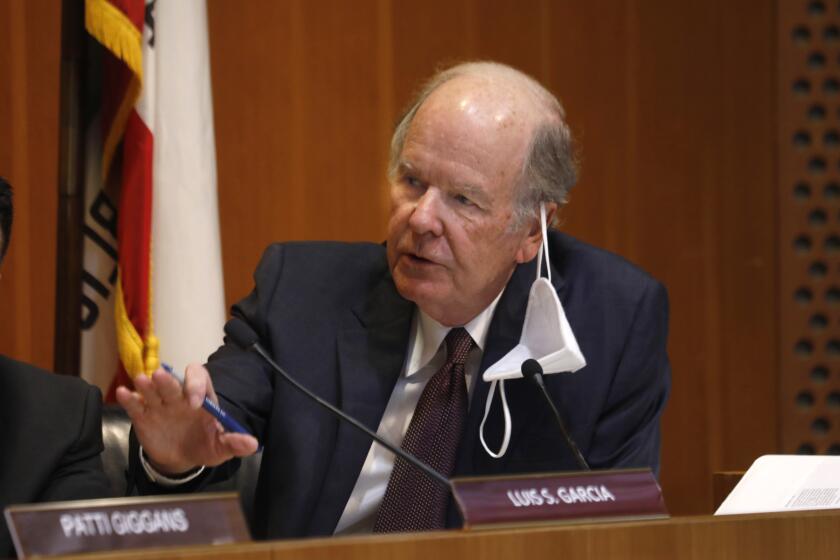IN FINAL ACTION
- Share via
The Legislature passed a mountain of bills in the last days of the session. Among the most interesting:
Higher Unemployment Benefits OKd
A bill to raise California’s maximum unemployment benefits from $166 to $188 a week and tighten eligibility standards is on its way to Gov. George Deukmejian. The Senate gave the measure final legislative approval on a 22-13 vote, despite opposition from business interests that had sought even tougher criteria to qualify for the benefits. Deukmejian vetoed a similar measure last year. The bill, by Sen. Herschel Rosenthal (D-Los Angeles), would cut off unemployment payments to 35,000 to 40,000 people by raising the minimum amount that workers must earn to qualify for benefits, and it would slightly reduce the rate of unemployment insurance taxes paid by employers. Starting Jan. 1, a worker would have to take in $1,550 during a base year or earn $1,175 total during the year and $20 in each of eight weeks to qualify for benefits.
Bill Holds Offshore Drillers Liable
A bill making oil companies fully responsible for any damages caused by their offshore operations passed the Assembly 44 to 26 and was sent to the governor. The legislation would hold firms involved in pumping and drilling for oil and natural gas off the California coast financially responsible for any damages, regardless of whether negligence could be proven, said Assemblyman Sam Farr (D-Carmel), author of the measure. “Specifically, this bill would make the oil companies responsible to businesses, such as fishing and tourism, that lost profits due to an oil spill,” Farr told the Assembly.
Lobby Effort for Atom Smasher Voted
By a vote of 52 to 1, the Assembly gave final legislative approval and sent to the governor a bill to create a commission to lobby the federal government to place a proposed $4-billion atom smasher in California. The federal government is planning to build a particle accelerator called a superconducting super collider, or SSC, that would consist in part of a buried circular tunnel about 30 miles in circumference. Several states are vying to get the project, which would have an annual operating budget of $250 million. Under the bill by Assemblyman Sam Farr (D-Carmel), a commission composed of the governor and other state officials would represent the state before the federal Department of Energy and develop plans to pay for California’s share of the project, should the state be chosen.
Compensation to Melon Farmers OKd
A $6.2-million bill to compensate watermelon growers and others who suffered financial harm last summer because of a state recall of pesticide-tainted melons was sent to the governor after being approved by the Assembly, 57 to 17. The recall was ordered after an outbreak of illnesses occurred that was later attributed to improper use of the pesticide aldicarb on the melons. The attorney general’s office subsequently sued three Kern County growers, accusing them of illegal use of the pesticide. Grocers, brokers and shippers also would be eligible to file claims for financial losses from the watermelon recall under the bill by Assemblyman Norman Waters (D-Plymouth).
Legislators OK Own Health Care Plan
Assembly lawmakers without debate passed 80 to 0 and sent the governor a bill that would provide state-paid health and dental insurance coverage to legislators. The benefits extended in the bill, by Speaker Willie Brown (D-San Francisco), would be the same as those now given to state employees. The 120 lawmakers currently must individually purchase coverage under the state Health Care Program, except upon retirement when the state picks up a share of the tab. For other state employees, the state contributes a minimum $88 for health care coverage. Extending the health coverage to state legislators was expected to cost taxpayers $323,000 a year. Legislative leaders said the health coverage would be financed by reducing state subsidies for cars now leased for lawmakers.
Aid to Strapped Counties Approved
Legislation to spend $8 million to attract industry and improve economic conditions in 42 financially strapped counties is on its way to Deukmejian, who supports it. The Senate gave final passage to the measure by Senate Republican Leader James W. Nielsen of Woodland on a 27-1 vote. Known as the Rural Economic Development Act of 1986, the measure forms part of the Rural Renaissance Program proposed earlier this year by the Republican governor. It would create a rural economic development program to equip agricultural and mountain counties with roads and basic facilities needed for industrialization. Imperial County is the only Southern California county to qualify for the program. Other areas are in the Central Valley, the central coast region and the mountains of Northern California.
Incentives for Relocated CHP Officers
California Highway Patrol officers promoted and relocated to high-cost housing areas would be given a $1,700 incentive under a bill given final passage by the Senate. The measure by Sen. Alan Robbins (D-Van Nuys) was sent to the governor on a vote of 29 to 0. The incentive would be given to officers promoted to the rank of sergeant or lieutenant in areas where recruitment has been a problem, particularly urban areas.
More to Read
Get the L.A. Times Politics newsletter
Deeply reported insights into legislation, politics and policy from Sacramento, Washington and beyond. In your inbox twice per week.
You may occasionally receive promotional content from the Los Angeles Times.










